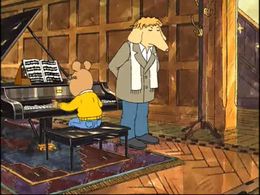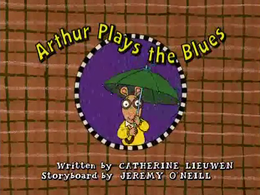The forum pages are fully operational! See this link for the latest forum topics, where users can collaborate or discuss certain topics in one place!
Arthur Plays the Blues (episode)
| This article is about the episode. You may be looking for the book. |
| "Arthur Plays the Blues" | |
|---|---|
| Season/Series: | 6 |
| Number in season: | 2A |
| Original Airdate: | |
| Credits | |
| Written by: | Catherine Lieuwen |
| Storyboard by: | Jeremy O'Neill |
| Episodes | |
| Previous "Best of the Nest" |
Next "Buster's Sweet Success" |
| Read transcript | |
| “ | Goodbye,Arthur. You're fired. | ” |
"Arthur Plays the Blues" is the first half of the second episode in the sixth season of Arthur. It was later adapted into the book Arthur Plays the Blues.
Summary[edit]
Arthur's piano teacher retires, mentioning that he will get along great with her replacement. But when Arthur meets the famous — and very strict — Dr. Fugue, he begins to doubt whether to keep up.
Plot[edit]
Arthur has a fantasy of being a famous concert pianist and playing a difficult concerto, at the end of which he thanks his piano teacher Mrs. Cardigan. Back in the real world he learns that Mrs. Cardigan is retiring.
Arthur Plays the Blues
Mrs. Cardigan has arranged for Arthur to be taught by Dr. Fugue, a former concert pianist.
On the playground Binky is envious, but he also warns Arthur that Dr. Fugue’s lessons are very challenging.
Arthur has his first lesson at Dr. Fugue’s house. Dr. Fugue is able to tell from the state of Arthur’s fingers how long he has been playing. He also criticizes Mr. Read’s car horn for being sharp and his own parakeet for singing too slow. Dr. Fugue makes Arthur play scales for an hour, then admits he seems to have some talent and gives him Bach’s “Two-Part Invention in F major” as homework and advises him to practice practice, practice.
At home, Arthur takes out the music. The piece is so dauntingly difficult that he decides to start practicing later.
He ends up not practicing until two days before the next lesson when his mother makes him practice for an hour. He is first distracted by D.W., then he falls asleep at the piano until the hour is over.
In his next lesson, Dr. Fugue notices immediately that Arthur has not practiced and fires him.
At first, Arthur is thrilled about not having to practice until his parents find him a new teacher. However, everything he watches on TV seems to be piano related.
He visits Mrs. Cardigan who tells him that he should win Dr. Fugue’s respect by playing his best, even if it is not perfect.
At home, Arthur starts practicing Bach’s Invention again. This time he ignores all distractions.
When he goes back to Dr. Fugue, another student has just been fired for “torturing” Bachs’s Invention. Dr. Fugue gives Arthur another chance to play, and although Arthur makes 78 mistakes Dr. Fugue takes him back as a student.
Characters[edit]
- Arthur Read
- Frederique Fugue
- Mrs. Cardigan
- D.W. Read
- Jane Read
- David Read
- Binky Barnes
- Buster Baxter
- Kenny
- Bruno's Music worker
- Kate Read(cameo)
- Francine Frensky(cameo)
- Tosca(cameo)
- Ethel(cameo)
- Liberace(mentioned)
- Yo-Yo Ma(mentioned)
- Timmy and Tommy Tibble(mentioned)
Trivia[edit]
- As with all season six episodes, the end credits originally featured a remixed version of Believe in Yourself. Beginning in 2015, the credits were reformatted for reruns and now include the standard version of the song.
- Yo-Yo Ma is a cellist. He was a guest star in “My Music Rules”.
- This is the first episode to be written by Catherine Lieuwen.
- The original airing with Justin Bradley doing Arthur's voice has never been released on any home media after the 2003 DVD.
- Timeline: The events of this episode are later referenced in "The Best Day Ever."
- Moral: Just because someone doesn't do well in music doesn't mean you fire them for your own personal benefit.
Errors[edit]
- When David honks the car horn, Dr. Fugue comments that it is a C-sharp, but it is actually a G-natural and B-natural simultaneously.
Cultural references[edit]
- Dr. Fugue’s parakeet Tosca is named after an opera by Giacomo Puccini.
- Johann Sebastian Bach’s “Two-Part Inventions” are a collection of fifteen short practice pieces for keyboard instruments. Arthur is given the Invention No. 8 in F Major, BWV 779.
- Władziu Valentino Liberace was a classically trained pianist, who became a famous entertainer. Liberace was best known for his fancy clothes and flamboyant behavior, both on and off stage.
- The Emperor Concerto is another name for Beethoven’s Piano Concerto No. 5
- When Arthur is flipping through TV channels, he sees parodies of Casablanca and The Phantom of the Opera.
- Near the end of this episode, Dr. Fugue mentions that he has a few minutes before Soul Train.
Home Video[edit]
DVD:
References[edit]

